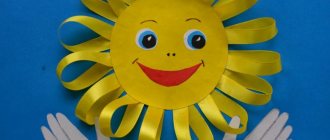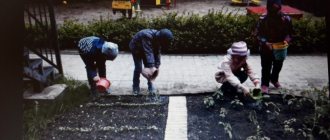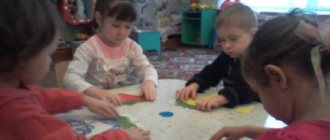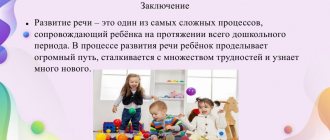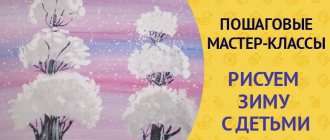TECHNOLOGICAL MAP of the Integrated lesson on the topic: “MIRACLES IN A BACKPACK”
Transcript
1 TECHNOLOGICAL MAP of an integrated lesson on the topic: “MIRACLES IN A BACKPACK” Educator: Dzyuban Alfiya Faritovna Work experience: 11 years CC: 1st category Date: r Age group: 2nd junior gr. Program content: Educational: Practice naming geometric shapes Activate children's speech, encouraging them to answer questions: (smooth or rough, light or heavy, soft or hard, light or heavy). Improve the skills of comparing two equal groups of objects, the ability to denote the results of comparison with the words: as much as, equally. Teach children to independently draw conclusions based on the results of the experiment. Developmental: Develop cognitive-research activities and productive (constructive) activities. Educational: Cultivate sympathy for the characters and evoke a desire to help them, cultivate interest in interaction with the teacher and peers. Preliminary work: experimenting with water, stones and nuts, watching the cartoon “Dasha the Traveler” Material used: trays with water, stones, nuts, geometric shapes, table for children’s experimentation.
2 Integrated educational areas: social-personal, cognitive, speech, productive and constructive activities. Types of children's activities that underlie the organization of educational activities: play, experimental activities. Form of organization of children: subgroup. Stages Objectives Forms for organizing joint activities Means used by the teacher Content of joint activities at each stage Teachers children Integration of educational areas Result, UUD Motivational incentive Organization of directed attention Psycho-gymnastics “Balloon flight” Balloon, gymnastic stick. -What is a journey? -whose travels we love to watch. What should you take with you on a trip? The ball hangs on a thin leg. It’s ready to fly up. Instantly we are already in flight. With it on top of the scaffolding. this is when you need to go somewhere. Dashitravelers Backpack and map. Social-personal area. speech area. Regulatory: attracting directed attention.
3 Organizational-search Develop cognitive activity in children through playful experimentation. introduce the properties of nuts and stones. Develop cognitive research activities and productive (constructive) activities. Changing the type of activity. -Surprise moment -Conversation -Rules of the game during experimentation - construction based on a model -Reading poems -Physical exercise -experiment; -independent activity of children to complete the task. Trays with water. Nuts, stones. Map, toy hedgehog, pencils, branches, toothpicks. Meeting with a fish? What geometric shapes does the fish consist of? Help me put the fish together. Well done!!..every fish should have a house. Folding houses from geometric shapes in a tray of water. (first from nuts, and then from stones). When we don't know where to go, who do we ask? We look at the maps and choose a path. Meeting with a hedgehog What shape does a semicircle hedgehog consist of? independent activity of children to complete the task. (folding a circle into a semicircle) The hedgehog has a problem: he has lost his needles. Shall we help? We look in the backpack and take out the pencils, do they fit? Why? -.square and triangle..yes...nuts are light, and stones are heavy..at the map...semicircle..yes..no, because I am very Social-personal, Cognitive, speech area. Cognitive, Communicative Personal: formation of cognitive activity, stress relief, interest in communicating with peers, formation of FEMP.
4 thick. We get the branches. are they suitable? Why? What is suitable for a hedgehog? Why? When we don't know where to go, who do we ask? We look at the maps and choose a path. Meeting a squirrel Where does a squirrel live, what does it eat? independent activity of children to complete the task. (comparing two equal groups of objects, the ability to denote the results of comparison with words: equally, as much - as. Well done!!...no, because they are crooked and not sharp..toothpicks...thin and sharp.. At the map...in the forest..with nuts ...there are as many nuts as there are squirrels, nuts and squirrels equally.
5 The squirrel has prepared gifts for you. (nuts), but I tried so hard that I mixed up nuts and pebbles. How do we separate the stones from the nuts? And what do we learn?..they need to be thrown into the water...light nuts will float, but heavy stones will sink. Final (Reflection) Well done!!! It's time to go home. Ball ball my airy fidgety, naughty ball round ball smooth ball light ball soft ball right ball left ball our glowing flashlight... round.. smooth light.. soft. Generating interest in the content of GCD. Summing up, motivation for further activities Social-personal, speech area, Cognitive and research. Cognitive, regulatory: Formation of ideas about stones and nuts.
6 Here we are at home, treat everyone to nuts. Did you enjoy our trip? What did you like? -children's answers—
7 TECHNOLOGICAL MAP of an integrated lesson on the topic: “MIRACLES IN A BACKPACK” Educator: Dzyuban Alfiya Faritovna Work experience: 13 years CC: 1st category Date: r Age group: 2nd junior gr. Program content: Educational: Practice naming geometric shapes Activate children's speech, encouraging them to answer questions: (smooth or rough, light or heavy, soft or hard, light or heavy). Improve the skills of comparing two equal groups of objects, the ability to denote the results of comparison with the words: as much as, equally. Teach children to independently draw conclusions based on the results of the experiment. Developmental: Develop cognitive-research activities and productive (constructive) activities. Educational: Cultivate sympathy for the characters and evoke a desire to help them, cultivate interest in interaction with the teacher and peers. Preliminary work: experimenting with water, stones and nuts, watching the cartoon “Dasha the Traveler” Material used: trays with water, stones, nuts, geometric shapes, table for children’s experimentation.
8 Integrated educational areas: social-personal, cognitive, speech, productive and constructive activities. Types of children's activities that underlie the organization of educational activities: play, experimental activities. Form of organization of children: subgroup. Stages Objectives Forms for organizing joint activities Means used by the teacher Content of joint activities at each stage Teachers children Integration of educational areas Result, UUD Motivational incentive Organization of directed attention Psycho-gymnastics “Balloon flight” Balloon, gymnastic stick. -What is a journey? -whose travels we love to watch. What should you take with you on a trip? The ball hangs on a thin leg. It’s ready to fly up. Instantly we are already in flight. With it on top of the scaffolding. this is when you need to go somewhere. Dashitravelers Backpack and map. Social-personal area. speech area. Regulatory: attracting directed attention. Develop -Surprise Trays with a Meeting with a Fish? -.square and Social-Cognitive, Communicative
9 Organizational-search cognitive activity in children through playful experimentation. introduce the properties of nuts and stones. Develop cognitive research activities and productive (constructive) activities. Changing the type of activity. moment - Conversation - Rules of the game during experimentation - construction based on a model - Reading poems - Physical exercise - experiment; -independent activity of children to complete the task. water. Nuts, stones. Map, toy hedgehog, pencils, branches, toothpicks. What geometric shapes does the fish consist of? Help me put the fish together. Well done!!..every fish should have a house. Folding houses from geometric shapes in a tray of water. (first from nuts, and then from stones). When we don't know where to go, who do we ask? We look at the maps and choose a path. Meeting with a hedgehog What shape does a semicircle hedgehog consist of? independent activity of children to complete the task. (folding a circle into a semicircle) The hedgehog has a problem: he has lost his needles. Shall we help? We look in the backpack and take out the pencils, do they fit? Why? triangle..yes...nuts are light, but stones are heavy..at the card...semicircle..yes..no, because they are very thick. personal, cognitive, speech area. Personal: development of cognitive activity, stress relief, interest in communicating with peers, formation of FEMP.
10 We take out the twigs. are they suitable? Why? What is suitable for a hedgehog? Why? When we don't know where to go, who do we ask? We look at the maps and choose a path. Meeting a squirrel Where does a squirrel live, what does it eat? independent activity of children to complete the task. (comparing two equal groups of objects, the ability to denote the results of comparison with words: equally, as much - as. Well done!!...no, because they are crooked and not sharp..toothpicks...thin and sharp.. At the map...in the forest..with nuts ...there are as many nuts as there are squirrels, nuts and squirrels equally. The squirrel has prepared gifts for you. (nuts), but so
11 I tried to mix up the nuts and pebbles. How do we separate the stones from the nuts? And what do we learn?..they need to be thrown into the water...light nuts will float, but heavy stones will sink. Final (Reflection) Well done!!! It's time to go home. Ball ball my airy fidgety, naughty ball round ball smooth ball light ball soft ball right ball left ball our glowing flashlight... round.. smooth light.. soft. Generating interest in the content of GCD. Summing up, motivation for further activities Social-personal, speech area, Cognitive and research. Cognitive, regulatory: Formation of ideas about stones and nuts. Here we are at home, give everyone a treat - children's answers
12 nuts. Did you enjoy our trip? What did you like? —

